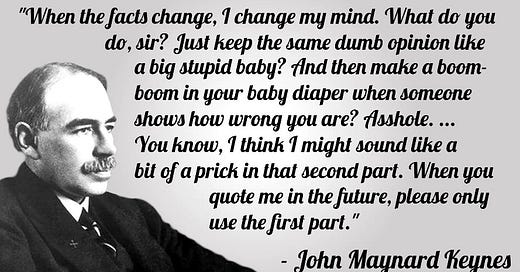Are We Getting Worse At Changing Our Minds?
I used to think "yes", but now I STILL think "yes"
There are two big problems with changing your mind. The first is that you have to acquire new information, and I’m sure we can all agree: Fuck that. I’m a busy guy; I have Funyons to eat and video games to play. I’m not going to pore through Economist articles and peer-reviewed research — or even Huffington Post articles and tweets from actors — trying to gather data when I already have an opinion. That’s just a hassle.
The second problem is that you have to admit that you were wrong. Admitting that you’re wrong is probably the most painful human experience that doesn't involve testicular trauma; I think humans are hard-wired to avoid it. In 1985, my dad bought a Betamax player, and no amount of subsequent developments could get him to admit that he made the wrong call. Well into the ‘90s, when the Beta section at our local Blockbuster had withered to just Tron and Tim Conway’s Dorf on Golf series, my Dad still argued that VHS was a fad and that he was some sort of Vonnegut-esque sane-man-in-a-mad-world figure.
Adapting your opinion to changing conditions is hard, but necessary. Clinging to outdated heuristics leads to bad decision-making; Noah Smith recently wrote about how “last war brain” is causing some on the left to reach faulty conclusions about inflation and Ukraine. It does seem to me that this type of thinking — or rather non-thinking — is currently more common on the left. Of course, I might just feel that way because: 1) I run in lefty policy circles, and 2) The GOP’s policy apparatus is like Toyota’s sewing machine division: Still technically around, but not exactly crucial to the operation. Regardless, I think it’s worth thinking about why outmoded thinking is so pernicious and why it might be becoming more common.





